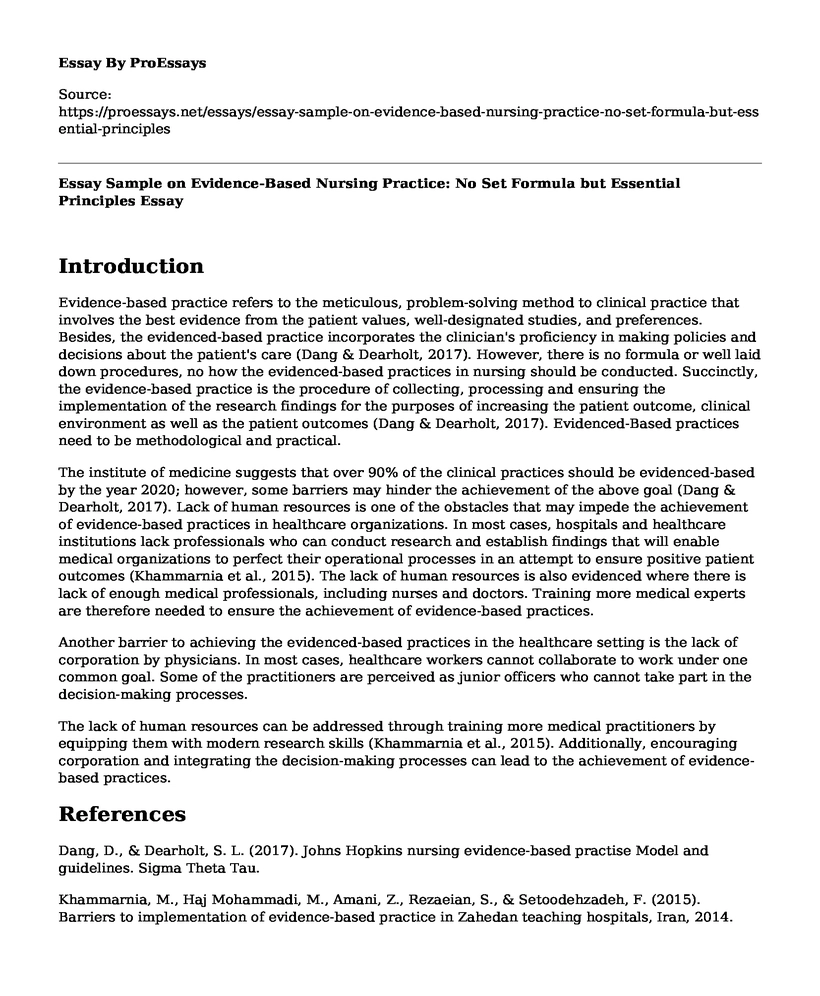Introduction
Evidence-based practice refers to the meticulous, problem-solving method to clinical practice that involves the best evidence from the patient values, well-designated studies, and preferences. Besides, the evidenced-based practice incorporates the clinician's proficiency in making policies and decisions about the patient's care (Dang & Dearholt, 2017). However, there is no formula or well laid down procedures, no how the evidenced-based practices in nursing should be conducted. Succinctly, the evidence-based practice is the procedure of collecting, processing and ensuring the implementation of the research findings for the purposes of increasing the patient outcome, clinical environment as well as the patient outcomes (Dang & Dearholt, 2017). Evidenced-Based practices need to be methodological and practical.
The institute of medicine suggests that over 90% of the clinical practices should be evidenced-based by the year 2020; however, some barriers may hinder the achievement of the above goal (Dang & Dearholt, 2017). Lack of human resources is one of the obstacles that may impede the achievement of evidence-based practices in healthcare organizations. In most cases, hospitals and healthcare institutions lack professionals who can conduct research and establish findings that will enable medical organizations to perfect their operational processes in an attempt to ensure positive patient outcomes (Khammarnia et al., 2015). The lack of human resources is also evidenced where there is lack of enough medical professionals, including nurses and doctors. Training more medical experts are therefore needed to ensure the achievement of evidence-based practices.
Another barrier to achieving the evidenced-based practices in the healthcare setting is the lack of corporation by physicians. In most cases, healthcare workers cannot collaborate to work under one common goal. Some of the practitioners are perceived as junior officers who cannot take part in the decision-making processes.
The lack of human resources can be addressed through training more medical practitioners by equipping them with modern research skills (Khammarnia et al., 2015). Additionally, encouraging corporation and integrating the decision-making processes can lead to the achievement of evidence-based practices.
References
Dang, D., & Dearholt, S. L. (2017). Johns Hopkins nursing evidence-based practise Model and guidelines. Sigma Theta Tau.
Khammarnia, M., Haj Mohammadi, M., Amani, Z., Rezaeian, S., & Setoodehzadeh, F. (2015). Barriers to implementation of evidence-based practice in Zahedan teaching hospitals, Iran, 2014. Nursing research and practice, 2015. Retrieved from: http://dx.doi.org/10.1155/2015/357140
Cite this page
Essay Sample on Evidence-Based Nursing Practice: No Set Formula but Essential Principles. (2023, Jan 30). Retrieved from https://proessays.net/essays/essay-sample-on-evidence-based-nursing-practice-no-set-formula-but-essential-principles
If you are the original author of this essay and no longer wish to have it published on the ProEssays website, please click below to request its removal:
- Empowering of Older People
- Business Intelligence Success Stories in Healthcare Sector Essay
- Questions and Answers on Nutrition Case Study
- Essay Sample on Work Ethic Related to Nursing
- Obesity is a Disease - Essay Sample
- Opioid Crisis: 40,000 Deaths and Counting - Essay Sample
- Essay Example on COVID-19: Online Learning Brings New Opportunities for Colleges & Universities







